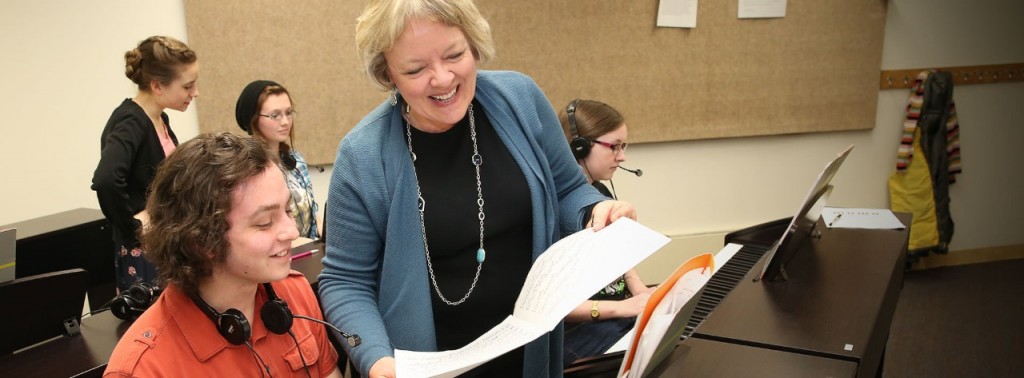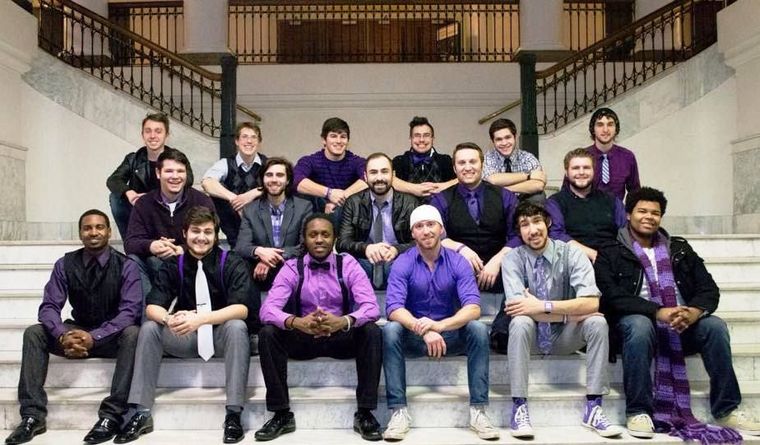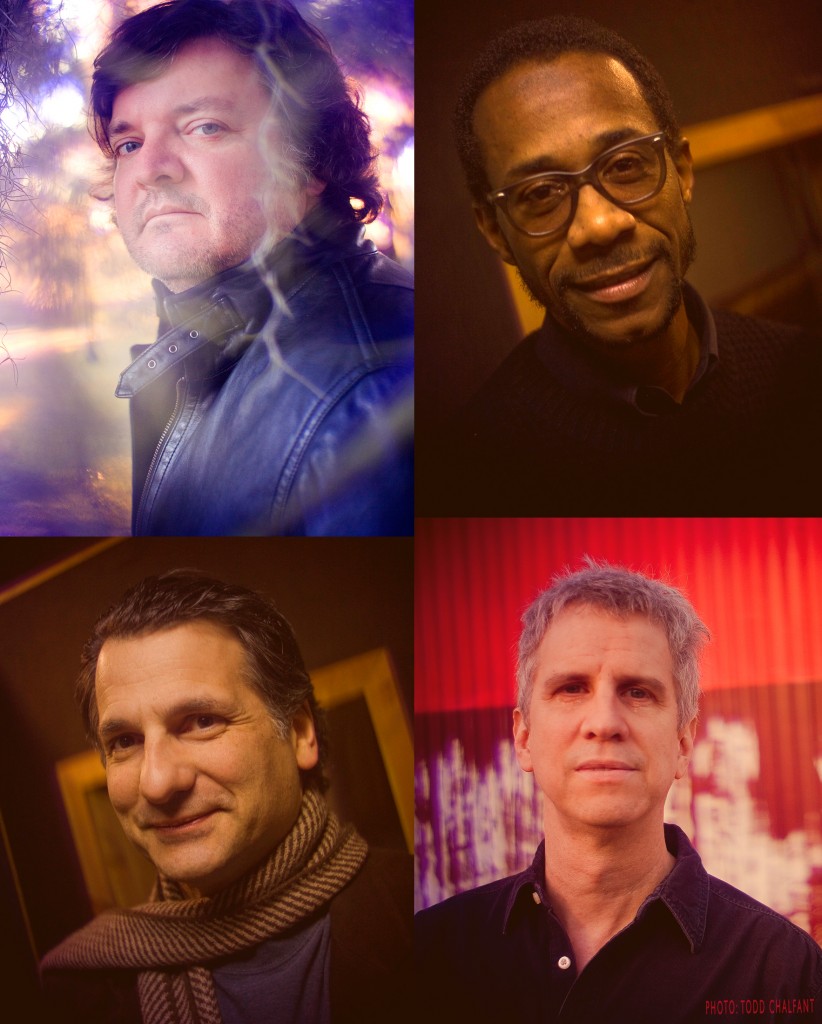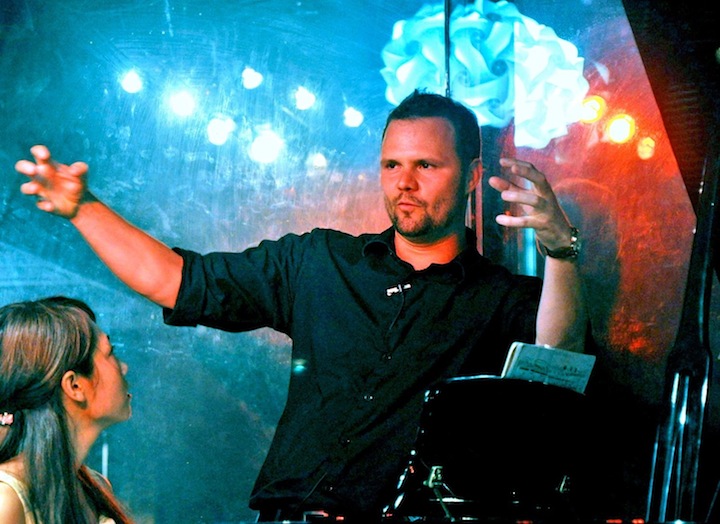
By Jen Sobolewski
About two dozen high school students climb off a school bus one cold March evening lugging instrument cases of varying sizes. They head into Moore Musical Arts Center to receive free specialized music instruction from BGSU faculty and students.
It’s called Music Plus and it’s been providing handpicked Toledo Public School (TPS) students a chance to not only experience a bit of what BGSU has to offer, but also the luxury of two hours to do nothing but focus on music.
Dr. Elizabeth Menard, an assistant professor of music education, has been running the program since 2009, assisted by Dr. Elaine Colprit, an associate professor of music education, and various graduate and undergraduate music students.
“It’s a wonderful outreach to the community, but even more beneficial may be the work our teachers get to do. No one is giving or getting more than the other. It’s a mutually beneficial relationship. That’s what a model service learning program should be.”The program started in 1995 and currently runs for 10 weeks during the fall and spring semesters. Band teachers from three TPS high schools—Start, Rogers and Bowsher—recommend outstanding students who have no other way to get additional music instruction. An average of 18-24 students come to BGSU every Wednesday from 6-8 p.m. for group and private lessons.
Menard said it’s taken awhile to get the program to where it is today.
“I tell you there have been real challenges to meet because of all the changes in the Toledo public schools over the years,” Menard explained. “It seemed to me that at least for the first few years there was always something new we were addressing such as schools closing or reconfiguring the school age arrangements. The last several years I’ve felt like I’ve finally had a handle on these things and now we can do the kind of teaching I’ve envisioned for the program.
“Just getting the bare bones in place has allowed the process to move forward and I can focus on the best and sometimes creative ways to teach the kids and provide excellent and creative field experiences for our teachers that are working in the program.”
Every week, Menard drives up to the designated pickup location at one of the high schools, checks in the students as they board the bus and then drives down to campus. Menard hired off-duty Toledo police officers to greet the students when they return and to make sure they get home safely.
Once they’re inside Moore Musical Arts, the students switch between private lessons and ensemble work. They also get instruction in music theory and composition as well as piano. On the flip side, their BGSU student instructors get vital teaching experience in many different areas.
“I think that service learning is such an important way to provide what everybody needs,” Menard said. “It’s a wonderful outreach to the community, but even more beneficial may be the work our teachers get to do. No one is giving or getting more than the other. It’s a mutually beneficial relationship. That’s what a model service learning program should be.”
In the piano room, you’re struck by the silence. Everyone wears headphones, so the only audible sound is the thump of fingers striking the keys. All skill levels are represented. One of the BGSU students helping with the class patiently explains the meaning of musical terms like staccato and legato to one participant.
That student is Lizzie Ritter, a freshman music education major from Ann Arbor, Mich.
“It’s so cool to see them take the musical skills they have and apply it to piano. Having a class like this helps them become better musicians overall,” Ritter said.
“I’m not a piano major, but I love it so much. It’s helped me realize the aspects of piano that are more challenging than others and how to be more clear about how I teach things and become a better musician.”
Over in the composition room, graduate student Andrew Selle listens to students’ ideas and offers his own suggestions. While some of the high school students go “old school” with a pencil and composition paper, most of them utilize iPads to put their ideas into musical notation.
“It’s interesting, a lot of people are scared to get started,” said Selle. “They don’t want to write anything or put themselves out there. It’s a scary thing when someone says ‘I want you to write something.’ So, you give them the building blocks and tell them, ‘We have a recital coming up and we’re going to play your stuff.’
“Most schools don’t have the time or teachers who want to pursue this either. I think it’s a side of musicianship that a lot of people don’t get exposure to—we’ve been told that once they start composing, they also get better in band and orchestra.”
Sean McMullen, a senior at Start High School, is a percussionist and marimba player in his school band. He’s also the self-appointed recruiter for the program. “I’m showing everyone new techniques and how amazing it is. I went in there and I said, ‘Here’s the deal. You should all come to Music Plus.’ I convinced like four or five other people from Start to come.
“I really enjoy it. You’re doing something fun and you’re learning. That’s amazing and you become a better musician.”
Fellow Start student Hanna Jalal typically plays trumpet, but is focusing on French horn during her time in the program. For her, the composition classes have been transformative.
“I’ll be around the house and have a thought in my head for a melody. Being able to put it on paper is really enlightening. I understand rhythms better and sight reading better, and if I can get piano down, I can play in the jazz band at school.”
Menard said it’s easy to get emotionally attached to the students. “Sometimes the officers will let me know if someone is having trouble, if he was suspended or worse. We’ve had kids who have stuck it out and we’ve had ones who have dropped out of school to pursue a different kind of life. The ones that have been here multiple years are proud of the fact that they’re a ‘regular.’ One woman started in middle school the first year I took over the program and she’s still coming at 19 years old, older than some of our BGSU freshmen. She’s very proud of the fact that she will graduate from high school and that this program has been a big part of her life.”
Isaiah Benjamin, a graduate student in violin performance from Dallas, said he identifies with many of these students.
“I remember growing up as a kid I didn’t get opportunities like this and it feels great to give to the community what I didn’t have. The kids are wonderful to work with and they have wonderful hearts. I get a sense of enthusiasm when they come here. They’re really excited. I can see it on their faces, especially when they learn something new.”
For all of these students, the time inside Moore Musical Arts gives them a chance to grow and explore music in a way that’s impossible during their regular band and orchestra classes.
“I think that in order to grow as a musician you have to have a passion for it, and it’s obvious that all these kids do, and after that passion you need someone to mentor you,” said Ritter. “This gives them an opportunity to ask the questions they wouldn’t be able to ask their band director as well as experience and some one on one mentorship and to have someone to look up to.”
Flute is Maddie Tucker’s main instrument, but she came to Music Plus to learn how to play trombone. “It’s really cool because we get two hours of free music lessons, which is great for someone who wants to try a new instrument and to be able to do that through our school.”
Maggie Marx plays piano, clarinet and bassoon at Bowsher. For her, the BGSU lessons are a stress reliever from the large high school band and orchestra classes. “I think it’s awesome. Not a lot of kids get to come down here every week. I’m glad I was chosen and I really want to come back next year.”
For Jalal, the importance of these lessons goes a bit deeper. “At my house I don’t really get an option to focus on music. My household is not very music welcoming, so to be able to come down here and have an escape to focus on music and do what I love, it’s great.”
The program is currently funded through the Marjorie Conrad Foundation. A final program will be held at 6:45 p.m. April 29 in Bryan Recital Hall where students will perform solos and hear student compositions performed for the first time.






